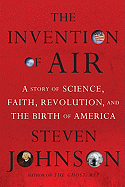

Johnson does not bring the training of a professional historian to his investigation of Priestley's life, but that's what gives this occasionally quirky book much of its appeal. He's more interested in trying to unravel intellectual puzzles such as why Priestley experienced an extraordinary burst of productivity between 1767 and 1775 (a combination of leisure time and his involvement with a stimulating group of fellow scientists part of England's "coffeehouse culture," Johnson concludes), or the impact of measuring devices on scientific progress, invoking concepts like "ecosystem theory," "long zoom" science and the Gaia hypothesis to make his points.
Readers only vaguely aware of Priestley as the "discoverer" of oxygen (a discovery for which Johnson is willing to accord him only partial credit, although he's quick to recount the delightful tale of Priestley's serendipitous discovery of soda water in a brewery) may be surprised by the breadth of his involvement in the vibrant intellectual and political life of the late 18th century. A close friend of Benjamin Franklin and Thomas Jefferson, Priestley was a vocal religious dissenter who helped found the Unitarian Church and was an ardent supporter of both the American and French Revolutions.
It was his sympathy for the latter that forced Priestley into exile in a small town in central Pennsylvania in 1794, not too far ahead of an angry mob that had torched his Birmingham home in 1791. Even here he was dogged by controversy, as his political writings almost resulted in his deportation under the controversial Alien and Sedition Acts. That episode, Johnson notes, became a major focus of the famous correspondence between Jefferson and John Adams later in their lives.
Johnson's central thesis in The Invention of Air is that the "vital fields of intellectual achievement cannot be cordoned off from one another and relegated to the specialists, that politics can and should be usefully informed by the insights of science." It's a worthy aspiration, and in advancing it he's chosen a fine exemplar of that ethos to describe in this stimulating work.--Harvey Freedenberg
Shelf Talker: Polymath Steven Johnson delivers a fascinating glimpse of Enlightenment intellectual and political history through the prism of the life of Joseph Priestley.

